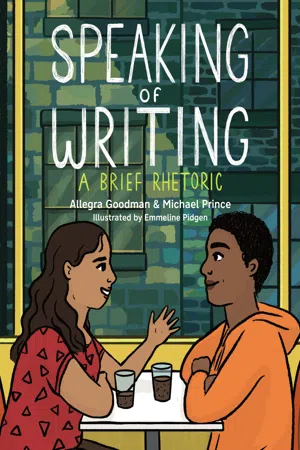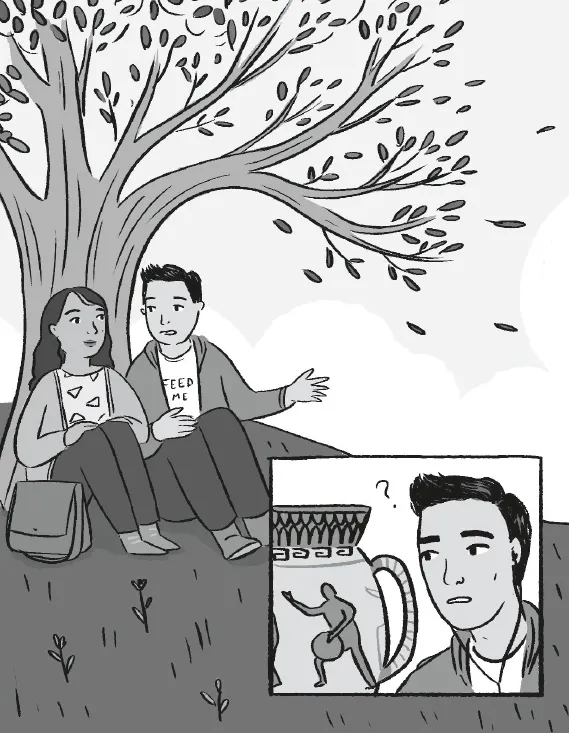![]()
1
WHAT YOU BRING/WHAT YOU CAN EXPECT
Writing a Literacy Narrative.
| ANNA | What’s up? |
| ZACH | Just my personal reflection, which will probably take me all day. We had to go to the museum to look at Greek urns and now we have to reflect on them. |
| ANNA | What’s so hard about that? |
| ZACH | Nothing—except I don’t know what to say. |
| ANNA | Just think. How did it feel to stand there and look at something so old? |
| ZACH | Annoyed. That’s how going all the way down there and looking at an urn made me feel. |
Attitudes
Some love to write. Some hate the very thought. Many students enjoy certain kinds of writing, but not others. Your success in college and beyond will depend in part on the attitude you bring to your work. How can you develop a positive attitude toward writing, even if you’ve struggled at times? Or, if you have always loved to write, how can you apply your love of writing to diverse assignments? Perhaps you feel ambivalent. You have done well with writing assignments previously, but you worry about how you will measure up in your new classes. How might you build on past experience to make the transition to writing in college?
What You Bring
What do you say to yourself when you sit down to write? One student might say—This will be interesting. Now I have a chance to express myself. Another might say—Okay, a three-page paper. I may as well get started. Clearly Zach tells himself a different story. Writing is confusing. You’re supposed to feel free, but you never really know what your instructor is looking for.
These are just some of the assumptions that students bring to composition. Over time, such statements can become self-fulfilling prophecies. If you enjoy writing, chances are you will approach your assignments optimistically if not with complete confidence. You may have discovered that writing about a topic helps you to understand it better. On the other hand, if you approach writing with anxiety, you may end up delaying and then rushing the task.
Zach is heading for an all-nighter. Waiting until practically the last moment, he loads up on caffeine, and scrambles to finish his assignment as the sun rises. Anxiety leads to avoidance, which leads to a miserably pressured writing process.
You can’t change long-held attitudes and preferences overnight, but you can learn to understand them and work with them—or around them. To this end, it’s useful to reflect on your personal history as a writer—both positive and negative experiences.
I’ve won poetry slams, and I get into the performance aspect of writing.
I like responding creatively to a prompt, like Animal. Go. Death of loved one. Go.
A negative writing experience is any three-to-five-page paper where I have to analyze something. I can crank it out, but there’s no joy.
I enjoy writing of all kinds. I keep a journal, and I also wrote for my high school newspaper.
I had a great experience with an article I wrote about endangered elephants. I felt like I was getting the word out.
Far more negative was when I came to America and did my first writing in school. My teacher marked many errors and asked me to get help from a tutor. I was embarrassed by this.
I’m a returning student, so it’s been a while since I’ve written an essay. I remember I used to write great papers, but that was years ago, before nursing school—and before kids!
I remember a positive experience in eleventh grade when I wrote a research paper on the Battle of Gettysburg. I really got into my sources—especially the eye-witness accounts: letters and photographs. I wrote 11 pages.
I had a negative experience with an essay test where I had 30 minutes to answer the question and I ran out of time. I start freezing up when I’m writing against the clock.
In general, I prefer assignments where I’m answering a specific question or presenting information. I had a positive experience putting together a science fair poster about probability.
I had negative experiences in high school with “creative” assignments like write a story from the point of view of a dolphin or write about your hopes and dreams.
When it comes to writing, there is no universal method. Indeed, if you ask professional writers about their writing processes, each will tell you a different story. Some write at night, some at dawn. Some work in coffee shops, others at a desk. There are those who write by hand on yellow legal pads, and those who type on laptops, those who prefer large blocks of time, and those who write a little every day. As you reflect on your own process, consider what is working, and what could be causing frustration or stress. Consider what you would like to learn, but also remember what you have to offer.
Approaching an assignment, you bring your history and experience with language. Jordan’s history as a writer includes some public speaking, and improv poetry slams. Anna’s history includes learning English as a foreign language in school. Kate returns to college with experience writing and editing a healthcare newsletter. Zach arrives with minimal writing experience. In high school he focused on math and music, and his English teachers did not assign many long essays. However, he has thought deeply about many social and political questions.
What You Can Expect
In an ideal world you would be able to apply your intellectual ability and experience directly to your work as a writer. However, it is not always easy to adapt your experience to your instructor’s expectations. The fact is that instructors in college expect a great deal. They expect you to understand course material, and to show them in writing that you understand it. They expect you to follow certain conventions for this writing, and, beyond this, to come up with your own ideas and develop cogent arguments. They hope to read your work without stumbling over tangled run-on sentences, or jumbled paragraphs, or multiple spelling mistakes and typos.
Writing in college, you know that your instructor will read your work. Your instructor will also expect a certain awareness of audience beyond the classroom. That audience could be general. Kate writes a paper on genetically modified food that could be provocative for anyone interested in the issue. On the other hand, your audience could be extremely specific. Zach plans to write a letter to a particular person. As we shall see in Chapter Two, successful student writers don’t just think about what they will write and how. They consider their audience, real and imagined.
As they read your work, instructors look for well supported claims and reasonable arguments. They want to move step by step through your written work, guided by the transitions you provide. And, of course, they want you to do all this on time. With rare exceptions, they insist on receiving written work by an announced due date.
Cogent arguments, lucid sentences, good transitions, correct documentation, clean copy—how will you get all of this done? You will need to develop a process that works for you as you meet the multiple expectations of courses that require writing.
Developing a Writing Process
When Anna describes her process, she talks about doodling before she begins writing. Jordan describes talking to himself. In contrast, Zach focuses on producing the draft itself. It’s true that generating a draft is a huge part of the writing process, but how do you get to a point where you can generate that draft? Where do you begin?
Before drafting, many successful writers allow themselves time to reflect on their assignment, ask questions, explore ideas. Instead of starting with complete sentences and finished paragraphs, many begin by doodling and scribbling notes. Another strategy—often overlooked—is to talk through ideas with others. Jordan is on to something when he mentions trying out ideas—even arguing with friends. This is an excellent way to test something you want to say—before committing to writing. Maybe your idea sounds great—or maybe it’s got some flaws, as your friends will tell you. Speaking, listening, and responding to comments or objections is a highly effective way to start the writing process. Anna decides to try this strategy as she tackles the first assignment in her freshman seminar: a literacy narrative.
When I am concentrating, I can type many paragraphs. The hard part is beginning, because I get nervous when I am not sure what I am going to say. When I am trying to think what to do, I will start at times by doodling words and even pictures on paper before I begin typing on my computer.
It’s easier for me to talk than to sit and type, so I start by walking around...








